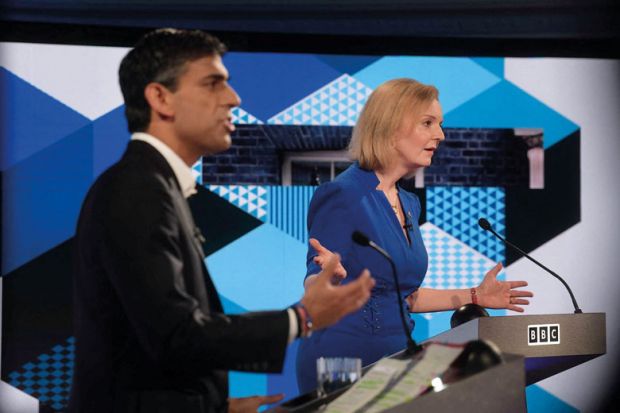English universities are bracing themselves for an uncertain future under a new government after a “depressing” Conservative leadership campaign that has revealed little about either candidate’s approach to higher education.
As Tory members choose between Liz Truss and Rishi Sunak, mention of higher education on the campaign trail has been limited to offering reforms to Oxbridge admissions or repeating culture-war tropes and broad-brush commitments to cracking down on degrees perceived to offer poor employment prospects.
While the lack of engagement with key sector issues such as funding was “depressing”, it was inevitable, said Andy Westwood, professor of government practice at the University of Manchester and a former special adviser to Labour universities ministers.
“We expect a level of detail that allows us to think into the future and make plans strategically and of course that is not the way politics works, and it is certainly not the way the politics of this leadership election is working,” he said.
Attention should instead turn to what happens after the new leader is elected, particularly as their term of office will shape the agenda for the next general election, said Professor Westwood.
A tough economic climate – and commitments to cut taxes – may force the next prime minister to reopen the spending review, which could undo funding promises made to universities, he warned.
But “it’s very hard to predict what will actually happen from September onwards”, said Jessica Lister, senior policy manager for higher education at the consultancy Public First.
“The direction for the new administration – including presumably a whole new team in the Department for Education and in BEIS [the Department for Business, Energy and Industrial Strategy] – could be very different from what’s being announced on the fly and under pressure during the campaign race.”
This could include figures familiar to the sector – such as business secretary Kwasi Kwarteng, tipped as Ms Truss’ potential chancellor – and others who are relatively unknown, including Kemi Badenoch, seen as a potential education secretary on the back of her own leadership campaign, which criticised “pointless” degrees.
Steve West, president of Universities UK and vice-chancellor of the University of the West of England, said he wanted “stability and focused engagement” as well as “long-term sustainable funding that delivers high-quality skills, education and research that supports growth in our economy”.
David Green, vice-chancellor of Worcester University, agreed more sustained investment was key, particularly for funded places for students to study medicine and teaching.
Post-Brexit, “there is an opportunity to promote universities – domestically and internationally – as one of the country’s great success stories”, said the University of Sunderland’s vice-chancellor, Sir David Bell.
“That requires a statement of vision and ambition for, and about, higher education, instead of an obsession with stoking imaginary grievances,” he added.
At the same time, universities must also show they are “up for a new settlement”, Sir David continued, and must respond “confidently to what is asked of us, whether that’s in dealing with students sympathetically in these troubled times, addressing our research and innovation activity to local, national and global challenges, or in preparing the workforce of, and for, the future”.
Professor Westwood said it will be hard to get airtime with a government that will likely be distracted by the cost-of-living crisis but the sector must try to construct relationships with new ministers and convince voters they should care about universities.
He noted that neither candidate was likely to implement many of their big ideas in the years before an election and so the focus will shift to manifesto writing.
“Then the policy agenda becomes wide open,” Professor Westwood said. “The starting gun gets fired on everything for everybody in terms of working up policy positions. Their horizons will shift to looking at what you can do by the end of the decade and then you can start to have a longer term, more constructive debate.”
POSTSCRIPT:
Print headline: Race for No 10 ‘depressing’
Register to continue
Why register?
- Registration is free and only takes a moment
- Once registered, you can read 3 articles a month
- Sign up for our newsletter
Subscribe
Or subscribe for unlimited access to:
- Unlimited access to news, views, insights & reviews
- Digital editions
- Digital access to THE’s university and college rankings analysis
Already registered or a current subscriber? Login








